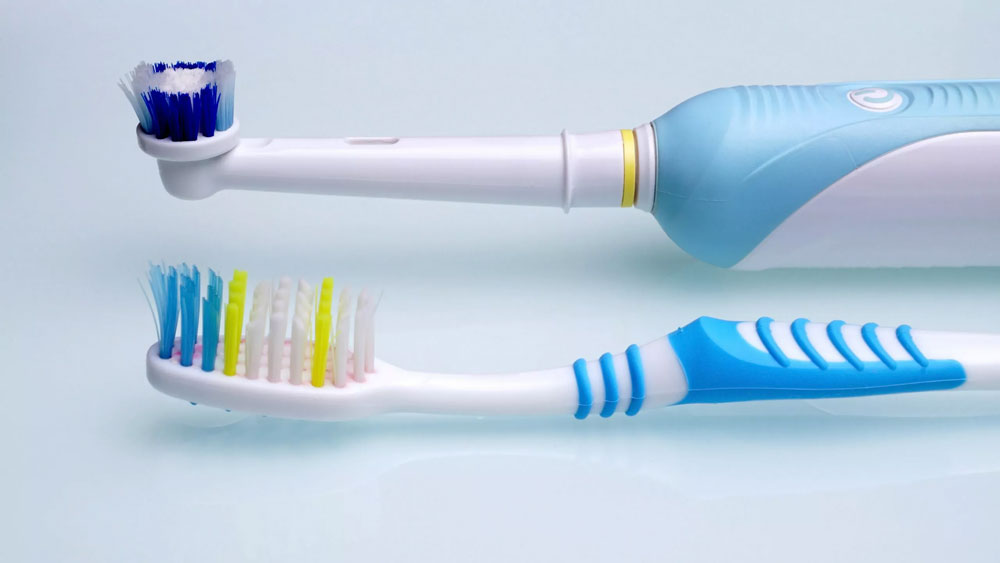
Both Manual and Electric Toothbrushes Clean Your Teeth Well
Brushing your teeth is one of the easiest, yet most important things you can do to care for your teeth. From the moment your baby teeth grow in, your parents teach you how to brush your teeth. You learn from a young age that brushing your smile cleans and protects your teeth.
Brushing your teeth removes plaque buildup, bacteria, and other harmful germs from your teeth and gums. It prevents tooth decay and gum disease, among other diseases and conditions. All dentists and oral care specialists agree that brushing your teeth is one of the best things you can do for your oral health.
Over the years, toothbrushes have evolved to better care for your teeth. The more we learn about dental hygiene, the better our tools become. For the majority of their existence, toothbrushes have mostly been manual. However, in recent years, electric toothbrushes have grown in popularity. But what’s the difference?
Cosmetic & Family Dentistry of Las Colinas understands the importance of proper oral hygiene, and we know that that starts with regularly brushing your teeth, regardless of if you use a manual or an electric toothbrush.
While brushing your teeth is vital to the health of your teeth and mouth, so is visiting your dentist for regular cleanings. If you cannot remember when your last appointment was, contact our clinic today to schedule your next appointment.
What’s the Difference?
The difference between manual and electric toothbrushes is quite evident at first glance. Manual toothbrushes have been around for a long time. They are simple and don’t have all the intricacies of an electric toothbrush, but they have lasted so long for a reason. Even though they require manual force to do most of the cleaning, manual toothbrushes are still an effective way of cleaning your teeth.
On the other hand, electric toothbrushes are more complicated than manual ones. Unlike manual toothbrushes, electric brushes have a small motor that makes the bristles vibrate or rotate, helping you remove plaque buildup on your teeth and gums. While they have not been around nearly as long, they have established themselves as an effective oral hygiene tool.
According to the American Dental Association (ADA), both are effective at removing plaque and bacteria from your gums and teeth, preventing tooth decay and disease. Each type of toothbrush has its own benefits, as well as cons.
Electric Toothbrushes
As we stated earlier, electric toothbrushes have a motor that makes the bristles vibrate or rotate to help you remove plaque from your teeth and gums. Unlike manual toothbrushes, electric toothbrushes allow for micro-movements to help you reach and clean certain areas better. They offer plenty of benefits to everyone.
Pros of Electric Toothbrushes
- More Effective at Removing Plaque: A study found that after three months, using an electric toothbrush reduced plaque buildup by 21% and gingivitis by 11%.
- Easy to Use: There are countless people out there who have mobility issues. When it comes to manual toothbrushes, they might struggle. Fortunately, electric toothbrushes do most of the work for them. These powered toothbrushes help those with arthritis, carpal tunnel, developmental issues, and more keep their mouth clean and healthy.
- Timed Brushing: Dental experts recommend brushing your teeth twice a day for two minutes. However, with a manual brush, people often do not brush their teeth long enough. Most powered toothbrushes have a built-in timer that makes sure you brush for the recommended two minutes.
- Improves Focus: A study discovered that people were more focused when using an electric toothbrush, which improved their brushing experience and improved how well they clean their teeth.
- Safe for Gums: Many people brush too hard with manual brushes because they think they have to work harder to get a better clean, which harms the gums. With an electric toothbrush, you do not have to brush hard at all, and the vibration is safe for your gums.
Cons of Electric Toothbrushes
- They are more expensive.
- As with manual toothbrushes, you need to replace the brush heads. However, not all stores carry them, so it may not always be easy.
- In a study of seniors, it found that powered toothbrushes did not significantly remove more plaque than manual toothbrushes. That does not mean they do no work, however.
- While they produce less waste, they are less eco-friendly than manual toothbrushes.
Manual Toothbrushes
When it comes to manual toothbrushes, you have to do most of the work on your own. That does not mean they don’t clean your teeth effectively. It just means you have to work more to get that same level of clean.
Pros of Manual Toothbrushes
- Easily Accessible: Manual toothbrushes have been around for decades, so at this point, you can find them virtually anywhere. Plus, you don’t need to charge them, meaning you can use them anytime and anywhere.
- Cheap: Electric toothbrushes require a motor, batteries, and more to function, which only increases their price. Manual toothbrushes are just a fraction of that cost. Some cost as little as $1.
- Removes Plaque: Even though powered toothbrushes require less work to remove plaque, manual toothbrushes can still remove harmful plaque and bacteria effectively.
- Safe for Small Children: Small children are not always the best when it comes to brushing their teeth. They often bite on their toothbrushes, which means you need to replace them more frequently. Fortunately, manual brushes are cheap. Additionally, electric toothbrushes may be too powerful for small, sensitive teeth. So manual toothbrushes might be best for young children.
Cons of Manual Toothbrushes
- One study found that people are more likely to brush too hard with a manual toothbrush than an electric one.
- Since they do not have a timer, people often do not brush long enough with a manual toothbrush.
- While people tend to focus more while using an electric toothbrush, people often do not put enough effort into brushing when using a manual brush, which leads to poor cleaning.
As you can see, manual and electric toothbrushes are very different from one another. However, they both exist with the same purpose: to remove plaque and bacteria from your teeth and gums. It does not matter which toothbrush you decide to use, as long as you are brushing your teeth properly.
Along with brushing your teeth, regularly visiting your dentist for dental cleanings is one of the best things you can do for your dental hygiene. Give Cosmetic & Family Dentistry of Las Colinas a call today to schedule your next appointment.
- Awareness16
- Bad Breath1
- Bone Grafting1
- Braces4
- Causes, Symptoms, And Treatments6
- Cavities5
- Chewing Gum1
- Cosmetic Dentistry of Las Colinas15
- COVID-192
- Deep Cleaning7
- Dental Anxiety1
- Dental Bridge2
- Dental Care27
- Dental Cleaning6
- Dental Crown1
- Dental Filling1
- Dental Health24
- Dental Implants6
- Dental Sedation1
- Dental Visit1
- Dental X Ray3
- Floss1
- Gum Dieseases4
- Injury1
- Insurance1
- Invisalign8
- Oral Cancer1
- Oral Hygiene24
- Root Canal9
- Sleep Apnea2
- Tartar1
- Teeth19
- Thanksgiving1
- TMJ1
- Tongue1
- Veneers2
- White Teeth12
Get Your Best Smile With Us
